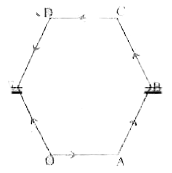If and the what can be concluded about the vector ?Solution in Tamil
The correct Answer is:Vector be any vector.
Step by step video, text & image solution for If vec a. vec a = 0 and vec a. vec b = 0 the what can be concluded about the vector vec b? by Maths experts to help you in doubts & scoring excellent marks in Class 12 exams.
Updated on:21/07/2023Topper's Solved these Questions
- VECTOR ALGEBRABOOK - NEW JOYTHI PUBLICATIONCHAPTER - VECTOR ALGEBRAEXERCISE - SOLUTIONS TO NCERT TEXT BOOK EXERCISE 10.4
12 Videos
- VECTOR ALGEBRABOOK - NEW JOYTHI PUBLICATIONCHAPTER - VECTOR ALGEBRAEXERCISE - ADDITIONAL QUESTIONS FOR PRACTICE 10.1
2 Videos
- VECTOR ALGEBRABOOK - NEW JOYTHI PUBLICATIONCHAPTER - VECTOR ALGEBRAEXERCISE - SOLUTIONS TO NCERT TEXT BOOK EXERCISE 10.2
19 Videos
- TRIGONOMETRIC FUNCTIONSBOOK - NEW JOYTHI PUBLICATIONCHAPTER - TRIGONOMETRIC FUNCTIONSEXERCISE - QUESTIONS FROM COMPETITIVE EXAMS
134 Videos
Similar Questions
Find ∣∣→a×→b∣∣ if →a=ˆi−7ˆj+7ˆk and →b=3ˆi−2ˆj+2ˆk.
View SolutionIn the figure which vectors are
(i) equal (ii) collinear (iii) coinitial

View SolutionCompute the magnitude of the following vectors.
→a=ˆi+ˆj+ˆk, →b=2ˆi−7ˆj−3ˆk
View SolutionIf A+B+C=90∘ then
cotA+cotB+cotCcotAcotBcotC =
View SolutionGiven that →a.→b=0and →a×→b=0. What can you conclude about the vectors →aand →b.
View SolutionIf →a.→a=0 and →a.→b=0, what can you conclude about the vector →b?
View SolutionIf →a.→a=0 and →a.→b=0 what casn you conclude about the vector →b?
View SolutionIf →a.→a.=0 and →a.→b=0 what can you conclude about the vector →b?
View Solutionयदि →a⋅→b=0 और →a×→b=0 तो, सदिश →a और →b के बारे में आप क्या निष्कर्ष निकल सकते हैं ?
View SolutionGiven that →a.→b=0and→a×→b=→0 . What can you conclude abut the vector →aand→b ?
View Solutionसिद्ध करें की सदिश |→a|→b+∣∣→b∣∣→a और सदिश |→a|→b−∣∣→b∣∣→a एक-दूसरे पर लंब हैं, जहाँ →a≠→0,→b≠→0
View Solutionयदि →A×→B=→0 तथा →A.→B=→0 हो तो क्या →Aऔर→B में से कोई शून्य सदिश होगा ?
View SolutionWhat can you conclude about four non - zero vectors →a,→b,→c and →d, given that : [(→a×→b).→c]+[(→b×→c).→d]=0 ?
View SolutionGiven that →a.→b=0 and →a×→b=→0. What can you conclude about the vectors →a and →b?
View SolutionGiven that →a.→b=0and →a×→b=0. What can you conclude about the vectors →aand →b.
View SolutionIf →a.→a=0 and →a.→b=0, what can you conclude about the vector →b?
View Solution
